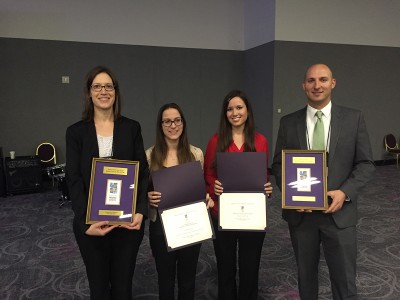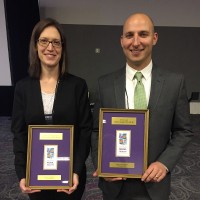 Good things continue to happen for the Music Therapy area at Colorado State University as a current student, recent alum, and two faculty members were honored at the 2015 American Music Therapy Association conference, held Nov.12-15 in Kansas City, Mo. According to the American Music Therapy Association’s (AMTA) website (musictherapy.org), the professional organization annually acknowledges individuals who have made significant contributions to AMTA through education, service, clinical practice, and/or research. These awards honor music therapists and their long term efforts towards the development and growth of the profession of music therapy.
Good things continue to happen for the Music Therapy area at Colorado State University as a current student, recent alum, and two faculty members were honored at the 2015 American Music Therapy Association conference, held Nov.12-15 in Kansas City, Mo. According to the American Music Therapy Association’s (AMTA) website (musictherapy.org), the professional organization annually acknowledges individuals who have made significant contributions to AMTA through education, service, clinical practice, and/or research. These awards honor music therapists and their long term efforts towards the development and growth of the profession of music therapy.
Currently a senior Music Therapy Major, Stephanie Kaiser won the AMTA 2015 Gaston Award given to the top undergraduate research paper. Stephanie's paper, titled “The Impact of Visual and Auditory Deprivation Upon Rhythmic Replication in Adults,” was a class project she completed last spring in MU 343: Research Methods in Music Therapy. The Gaston Prize includes opportunity for peer-reviewed publication in one of the industry journals and a cash award.
A recent graduate of the Music Therapy Equivalency and Master’s Degree program at CSU, Tricia Hickle is the recipient of the 2015 AMTA Edwina Eustis Intern Scholarship. This award is given to an outstanding undergraduate or graduate equivalency student who has shown excellence in scholarship, community involvement, and clinical work. This award included a cash prize to help with internship expenses.
Andrew Knight, assistant professor of Music Therapy is the recipient of the 2015 AMTA Service Award. This award is given to an individual who has exemplary service to the profession, and Dr. Knight was specifically recognized for his work on AMTA committees, his prior role as council coordinator on the Board of Directors, and his efforts co-creating the Music Therapy Frunners (running fundraising) group, raising over $10,000 to support music therapy.
 Blythe LaGasse, coordinator and associate professor of Music Therapy is the recipient of the 2015 AMTA Research Publications Award. This award honors an AMTA member who has contributed to the development of the profession through research, scholarly activity, or creative products resulting in advanced knowledge and development in the profession of music therapy. In addition to several solo and student co-authored publications this year, Dr. LaGasse serves on the editorial boards of both the Journal of Music Therapy and Music Therapy Perspectives, and was a panel expert in music therapy and autism research at AMTA Research 2025.
Blythe LaGasse, coordinator and associate professor of Music Therapy is the recipient of the 2015 AMTA Research Publications Award. This award honors an AMTA member who has contributed to the development of the profession through research, scholarly activity, or creative products resulting in advanced knowledge and development in the profession of music therapy. In addition to several solo and student co-authored publications this year, Dr. LaGasse serves on the editorial boards of both the Journal of Music Therapy and Music Therapy Perspectives, and was a panel expert in music therapy and autism research at AMTA Research 2025.
CSU Music Therapy faculty continue to be honored for their groundbreaking research and activities. Here are the full narratives for Dr. Knight and Dr. LaGasse’s 2015 American Music Therapy Association awards.
Dr. Andrew Knight
There are only a few people that would train to run 26.2 miles, let alone endure such an event in the name of their professional association. Dr. Andrew Knight not only ran the Chicago Marathon in 2012, but also challenged other music therapists to do the same and publicized his efforts in order to raise over $1,600 for the American Music Therapy Association. Since this initial event Dr. Knight has continued raising money while training for triathlons and marathons, single-handedly raising over $3,300 for the AMTA.
After the Chicago Marathon, Dr. Knight established the Music Therapy Frunners with fellow running enthusiast Michelle Kennemer. Beginning in 2013 the Frunners group has included individuals who run, bake, and organize other creative events advocating and fundraising specifically for the AMTA. This group collectively raised over $12,000 for the AMTA in 2013, and has a goal of $20,000 by the end of 2015.
In addition to his remarkable efforts in fundraising for the AMTA, Dr. Knight has served the AMTA through continued services on regional and national boards. Dr. Knight served on the AMTA Board of Directors as council coordinator for Association Services from 2009-2013. He has served on the Assembly of Delegates each year since relocating to the Midwestern Region in 2009. He also served on the AMTA Academic Program Approval Committee from 2009- 2010, and was an initial member of the previously titled Communication and Technology committee.
Dr. Knight has served as the Midwestern Region online media coordinator since 2009 and served the Great Lakes Region in the same role until last year. He also served as the Student Affairs Advisory Board representative from 2009-2015. He started the AMTAS-University of North Dakota chapter and advised it before coming to Colorado State to be the faculty advisor here in 2014. In recognition of his commitment to the Midwestern Regional board and Midwestern Student Association, Dr. Knight was the recipient of the Midwestern Region Service Award in 2010.
Dr. Knight currently serves as President-Elect and Assembly Delegate for the Midwestern Region. He is an appointed member of the Judicial Review Board and a member of the Journal of Music Therapy editorial board. He has served as a guest reviewer for Music Therapy Perspectives on numerous occasions. Collectively, Dr. Knight has served the AMTA on seven different committees/boards since 2009.
In addition to his commitment to the AMTA though fundraising and committee work, he has been part of advocacy and state recognition efforts in three states. As a professional in Wisconsin, he was public relations chair and part of “Hill Day” efforts there, which provided needed experience in leading the effort in North Dakota to create the first bill for a music therapy license in the nation. His efforts were recognized with the AMTA Changemaker Award for Music Therapy Advocacy in 2012. He continues to work with the Colorado state task force in their important efforts to file legislation next year, and present his knowledge on these issues regionally and nationally.
Dr. Andrew Knight has an outstanding record of service for the American Music Therapy Association. His efforts have not only increased awareness of music therapy as a profession, but have also provided a valuable contribution to numerous AMTA committees and the AMTA Board of Directors. He is the type of person who will say “yes” to an opportunity to support the AMTA in order to push our profession forward. Dr. Knight is truly deserving of the AMTA Service Award.
Dr. Blythe LaGasse
Dr. Blythe LaGasse has established herself as a leader in music therapy research and scholarly activity not only in the United States, but she is also internationally known as an authority on music therapy and autism spectrum disorder and research critique. Aside from her experience serving on editorial boards of both the Journal of Music Therapy and Music Therapy Perspectives (MTP), her expertise was also valued as a guest co-editor for a special issue of MTP that focused on neuroscience and music therapy. She also recently served as an expert in music therapy and autism research on the AMTA Research 2025 panel.
Her drive to create and publish new knowledge in our profession is notable. She has a diverse portfolio of bylines to her credit, including eleven peer-reviewed articles, five invited papers, and six book chapters, including a fascinating exploration and collaboration of autism with Dr. John Carpente in Barbara Wheeler’s Music Therapy Handbook, just released in 2015. This variety of output is indicative both of Dr. LaGasse’s diligence in pursuing dissemination and how well respected she is by peers of all levels, areas, and approaches. Her presence in the Music Therapy Handbook, in Darrow’s An Introduction to Approaches in Music Therapy, and An Introduction to Music Therapy: Theory and Practice, the widely used intro textbook, means that thousands of music therapy students and music therapists have benefitted from her scholarly activity.
Beyond written publications, Dr. LaGasse is a mainstay at research poster sessions and seems to present at conferences whenever there is a slot for concurrent sessions. She is in demand as a speaker internationally, including invitations to the University of Toronto and a tour of eastern Asia that introduced the area to her skills as a presenter and ideas on neuroscience in music therapy. It is also likely that her innovation in creating the “Music Therapy Research Blog” in 2009 (www.musictherapyresearchblog.com) is one of the most impactful and far-reaching ways she has helped bring “current research to music therapy clinicians.” Subscribers and readers of this online forum benefit from her synthesis and summary of research articles outside of the field of music therapy, and how she is able to explain how music therapists can conceptualize and reframe the information for their own clinical work. Her overall efforts to help clinicians, and thus the profession in general, engage in more research are unsurpassed in the profession.
She is also sharing her passions for research with her students, having co-authored a variety of recent publications and research posters, as well as creating “research pods” with undergraduate and graduate students in music therapy. This also goes for students in other fields. Her work on campus with occupational therapy and neuroscience faculty members is resulting in interprofessional research that will provide inroads for music therapy to be better understood in those fields.
Dr. LaGasse is bringing research to music therapists in showing how they might conduct small-sample clinical research or even “crowd fund” for research. She is also actively conducting research, with current studies focused on neurophysiological measures for determining impact of music therapy in individuals with autism and the study of motor kinematics for individuals with a variety of motor planning difficulties.

